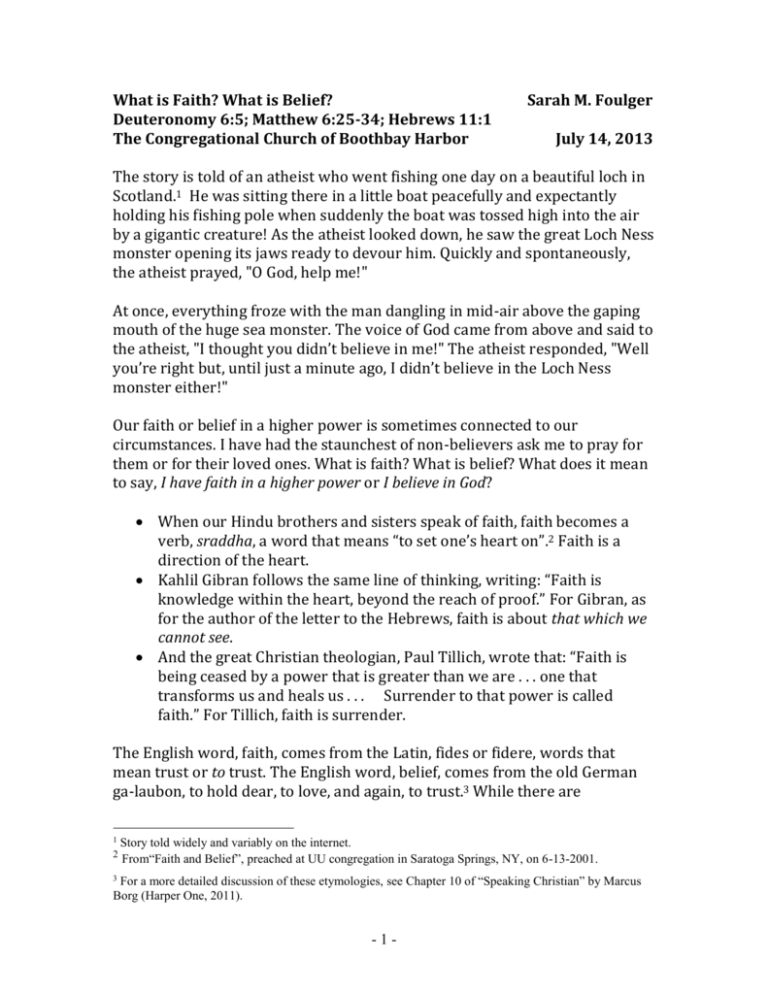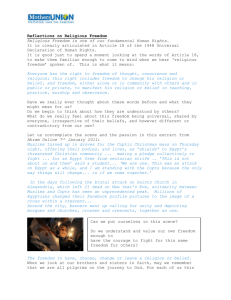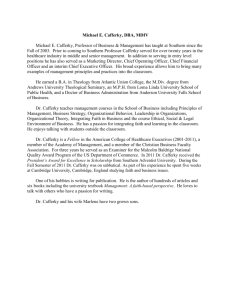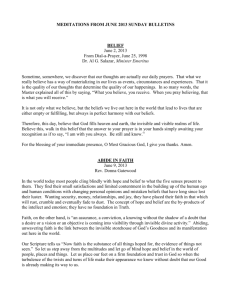I don't know when peace will finally prevail in the Middle East, or
advertisement

What is Faith? What is Belief? Deuteronomy 6:5; Matthew 6:25-34; Hebrews 11:1 The Congregational Church of Boothbay Harbor Sarah M. Foulger July 14, 2013 The story is told of an atheist who went fishing one day on a beautiful loch in Scotland.1 He was sitting there in a little boat peacefully and expectantly holding his fishing pole when suddenly the boat was tossed high into the air by a gigantic creature! As the atheist looked down, he saw the great Loch Ness monster opening its jaws ready to devour him. Quickly and spontaneously, the atheist prayed, "O God, help me!" At once, everything froze with the man dangling in mid-air above the gaping mouth of the huge sea monster. The voice of God came from above and said to the atheist, "I thought you didn’t believe in me!" The atheist responded, "Well you’re right but, until just a minute ago, I didn’t believe in the Loch Ness monster either!" Our faith or belief in a higher power is sometimes connected to our circumstances. I have had the staunchest of non-believers ask me to pray for them or for their loved ones. What is faith? What is belief? What does it mean to say, I have faith in a higher power or I believe in God? When our Hindu brothers and sisters speak of faith, faith becomes a verb, sraddha, a word that means “to set one’s heart on”.2 Faith is a direction of the heart. Kahlil Gibran follows the same line of thinking, writing: “Faith is knowledge within the heart, beyond the reach of proof.” For Gibran, as for the author of the letter to the Hebrews, faith is about that which we cannot see. And the great Christian theologian, Paul Tillich, wrote that: “Faith is being ceased by a power that is greater than we are . . . one that transforms us and heals us . . . Surrender to that power is called faith.” For Tillich, faith is surrender. The English word, faith, comes from the Latin, fides or fidere, words that mean trust or to trust. The English word, belief, comes from the old German ga-laubon, to hold dear, to love, and again, to trust.3 While there are 1 2 Story told widely and variably on the internet. From“Faith and Belief”, preached at UU congregation in Saratoga Springs, NY, on 6-13-2001. For a more detailed discussion of these etymologies, see Chapter 10 of “Speaking Christian” by Marcus Borg (Harper One, 2011). 3 -1- distinctions to be made between the words Faith and Belief4, this morning I use them interchangeably. Faith and belief are not primarily matters of intellectual acceptance of particular ideas about God or Jesus or heaven or hell. In fact, utter confidence about doctrine or dogma is what gets us into trouble.5 What Religion scholar, Lesley Hazleton, calls “closed minded certainty” is what leads to militaristic fundamentalism in Islam, Judaism, and Christianity. Such closed-minded certainty also leads us away from divine mystery and majesty. Faith and belief are primarily and most deeply, and sometimes mystically, matters of the heart, matters of spiritual surrender or letting go, matters of mystical trust in the great spirit, the creator and sustainer of life. Faith is trusting that God is watching over you or, better still, that God is walking beside you. Belief is trusting that the good and loving and just and redemptive purposes of God are prevailing. I have just said that faith is not primarily a matter of believing particular things yet this is a very common way of understanding faith, perhaps even the most prevalent way of defining faith or belief. Articulating the substance of our faith can be useful. The great belief of the Jewish people, for instance, is summed up in Deuteronomy in words that are spoken at the beginning of nearly every service of worship: Hear, O Israel, the Lord our God is one. These words, called the Shema ()עמְׁ ש, ַ the Hebrew word for hear, center the Jewish people in the belief that there is but one God. The words go on: and you shall love the Lord your God with all your heart, soul, and might. It is powerful in its simplicity. This is what we believe: God is one. And this is what we do: Love God with every ounce of our being. If we could keep it that simple in the Christian Church, our life together, and certainly our history, would be far less conflicted. Christians have wasted more energy fighting about how many angels can dance on the head of pin, arguing with one another about the virgin birth or the path of salvation or transubstantiation of communion elements or the proper way to worship or which form of the Lord’s Prayer is most acceptable. This is not faith. This is intellectual egoism and cerebral snobbery and it is really quite predictable and by my standards, therefore, even boring. 4 Etymological and Theological Distinctions. For a very compelling discussion of this matter, visit TED talks at ted.com and search for Lesley Hazleton’s , “The Doubt Essential to Faith”. 5 -2- Faith as a relationship of trust in a power and a mystery that defies theological formula is infinitely more compelling and worthwhile and energizing. Faith as trust, believing as trust, these are the deepest levels of religious experience and commitment. This kind of dynamic faith, trusting faith, is crystal clear in the life and teachings of Jesus, who entrusted everything to God, who believed that, even as God clothes the grass and the lilies of the field, God would take care of his every need – and our every need. As I ponder the various challenges and traumas that are taking place in some of your lives, placing your trust in God is the profoundest spiritual response to all of them. To those who have recently lost a loved one, the highest form of faith and belief is trusting that God’s love and grace are stronger than death and that God is weeping with you and holding your dear one in unconditional and eternal love. To those who are struggling with illness, the highest form of faith and belief is trusting that God is with you, offering you strength and courage to improve or to cope or to move beyond or to rise above. To those who are facing the end of a particular chapter in your life, the highest form of faith and belief is trusting that God has set a feast for you in the next chapter. Marcus Borg offers a beautiful metaphor for this kind of faith. “Faith,” he writes, “is like floating in a deep ocean. If you struggle, if you tense up and thrash about, you will eventually sink. But if you relax and trust, you will float… Faith is trusting in the buoyancy of God.”6 This is the kind of faith worth developing. This is the kind of belief I wish for you a faith, a belief, that is not strictly a matter of the head, not simply an intellectual exercise, but faith that is a matter of the heart, a faith based in ongoing conversation with the living & mysterious God; a belief that gives your soul strength for living; a faith that increases you courage; a belief that offers stamina and hope; a faith that helps you to float graciously and bravely in the deep and sometimes raging ocean of this life. May it be so. Marcus Borg, “The Heart of Christianity” p. 31. This idea is also articulated by Catherine of Sienna and by Kierkegaard. 6 -3-







